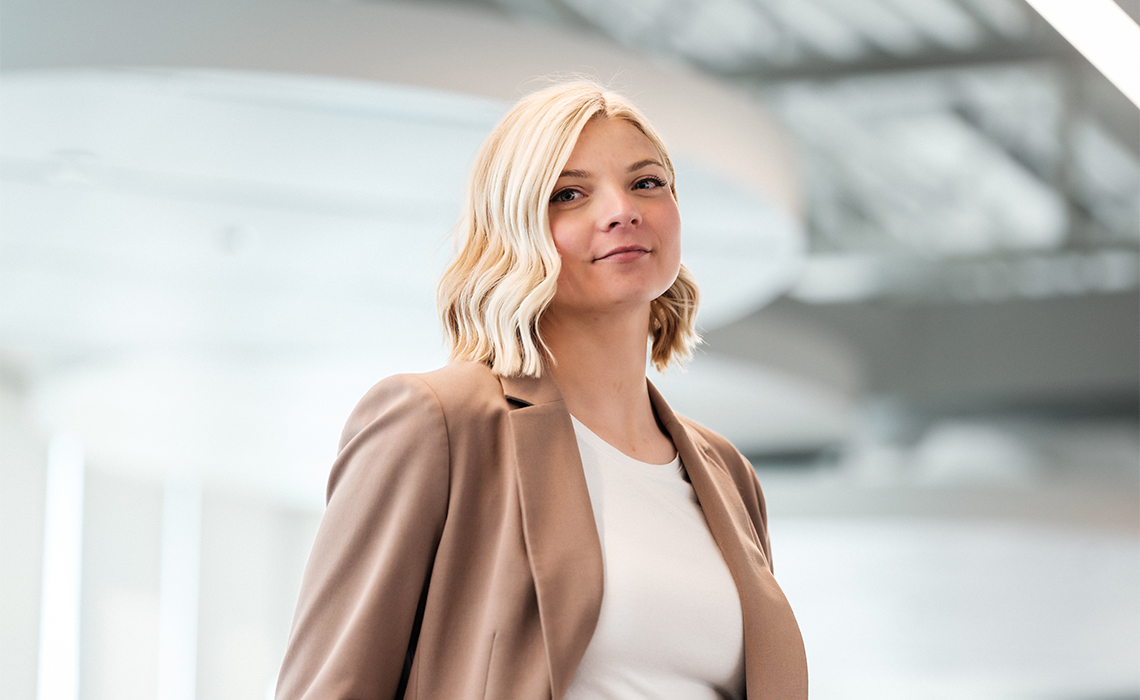Championing inclusive, community-centred recreation

This profile is part of Celebrate U, Mount Royal's employee rewards and recognition program. The University values and appreciates the exceptional work and contributions of our employees. Through this program, we aim to celebrate those who have dedicated themselves to the success of Mount Royal.
The world of sport can feel like a daunting one to wade into, especially if you feel like you’re on the outside looking in. Kirsten Kirwer is reimagining recreation and sport at Mount Royal University by centering inclusion, equity and — most importantly — joy for people who are new to sport or who have been traditionally left on the sidelines.
Kirwer is something of a homegrown hero; they were part of the first full graduating class from MRU’s health and education degree and majored in physical literacy. After completing their Master's in Kinesiology, Sport, and Recreation at the University of Alberta, they returned to Calgary and eventually to MRU due in no small part to the community she left behind.
“This evident community and the potential to give back in a way that very much aligned, yet challenged me, not only through recreational sports, but through teaching within HPED as well, made the decision pretty clear to me,” Kirwer says.
“It has been an extremely rewarding experience to be able to return to MRU and have an impact on the programs that I took part in as a student.”
Now, as the Recreational Sports Supervisor in Cougars Athletics and Recreation (CAR), Kirwer actively removes hurdles and breaks down barriers by creating intentionally designed or modified sports opportunities (Intramurals, CAR Clubs, Drop-in Sports, and Learn 2 Play programs) where people can move their bodies in a way that is affirming and meaningful to them.
“What gets me excited about ensuring everyone has a place in recreational sports at MRU is thinking about how we cultivate a love of sport and the joy it can bring to those who were previously engaged, or have never been engaged.”
Evening the playing field
Kirwer says that while most people who participate in sport don’t ever reach an elite level, the focus on professional sports puts pressure on kids and young adults, leading to burnout and ultimately people losing their love for movement and dropping sports altogether. And that doesn’t even begin to address systemic barriers that may be in place — things they aim to change.
One particular community’s barriers in sport Kirwer is eager to address is the 2SLGBTQIA+ community.
“The reason I am so invested in supporting the students who are leading this work is because, as someone who grew up in sport, homophobia and transphobia were atrociously evident, whether by coaches, other players, or culturally,” they say.
Kirwer is supporting work being spearheaded by CAR student staff members who are keen to create opportunities for 2SLGBTQIA+ students.
“It is important that those who have not participated or stopped participating due to homophobia or transphobia have a place to reimagine what sport and physical activity could mean to them and how it could become an enjoyable experience.”
Be curious, not judgmental
Kirwer has also partnered with MRU’s Iniskim Centre to help make sport — an arena that has historically been weaponized — more welcoming to Indigenous students.
“We found that we were often slapping on bandaids over the hindrances our IUBP (Indigenous University Bridging Program) students were facing when trying to access or participate in Recreation,” they say, adding those bandaid solutions didn’t ever help identify or truly remove barriers for Indigenous students.
Understanding both historical and current truths of sport within Indigenous communities was an important part of beginning to remove barriers, and Kirwer hopes it is also a step towards reconciliation.
“Working with Iniksim allowed us to deconstruct how our programs are offered and innovate as to what programs could be if developed with an Indigenous understanding,” they say.
“Sport is meant to be a facet of life that brings joy, brings community and brings space for internal motivation to our lives.”

